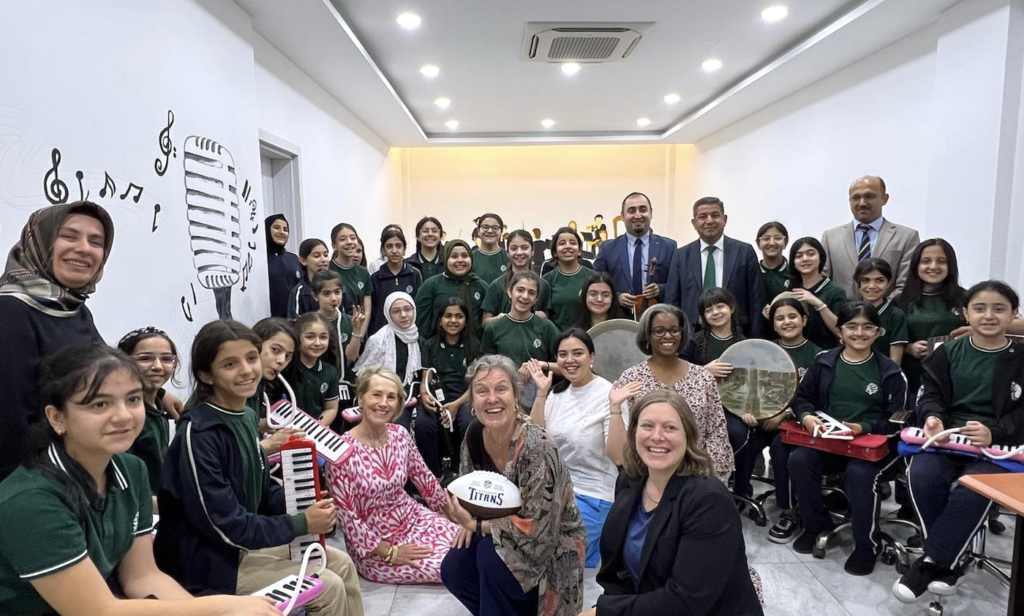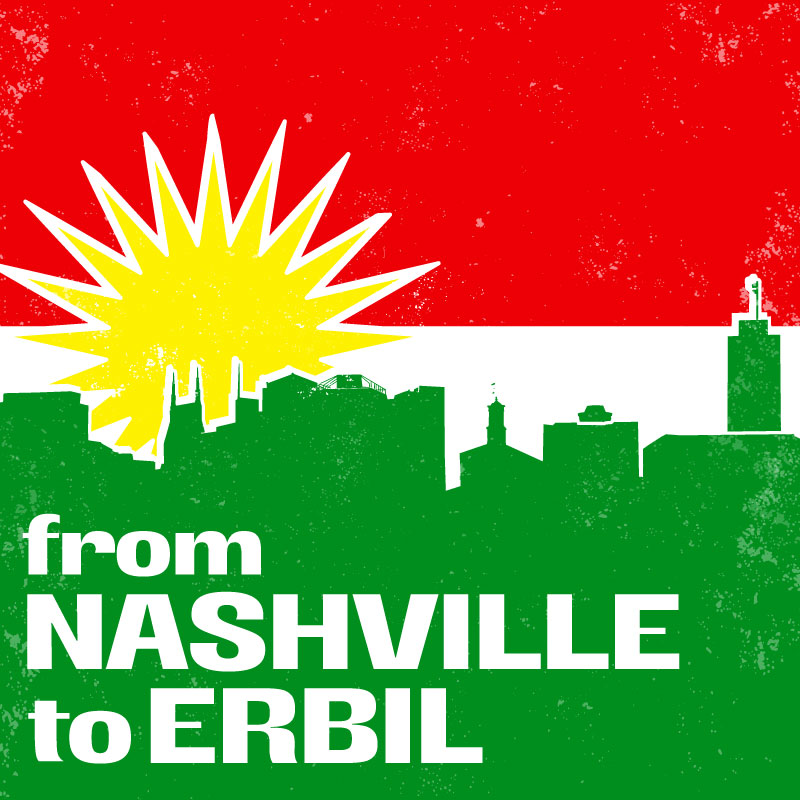
A partnership roughly a decade in the making is about to become official: Nashville and Erbil, the capital of the Kurdistan region of Iraq, are in the homestretch of formalizing a relationship as “sister cities.” Erbil would become Nashville’s tenth sister — a designation that involves travel, cultural and professional exchanges.
In May, a delegation from Sister Cities of Nashville went to Erbil and connected with the Kurdish-American Cultural Institute to solidify a formal partnership.
The delegation attended a tea ceremony, visited schools and cultural sites, and had meals and meetings with Erbil residents and top officials. Following the trip, the nonprofit’s board voted to approve the connection.
The trip came about a year after an Erbil contingent visited Nashville. That group was treated to meetings with the mayor and other city officials, a tour of the Convention Center, a visit to the Votes for Women Room at the downtown public library, and a walk along Lower Broadway, among other events.
How did Sister Cities get started?
The concept grew up out of the Cold War. President Dwight D. Eisenhower supported the idea of partnerships between U.S. and foreign cities. The umbrella organization developed from there, and each city runs its own chapter.
“When President Eisenhower started this movement in 1956, his sense was that it was always going to be about the people in those places. He called them citizen diplomats,” says former Nashville Mayor Bill Purcell, who has been involved for years and is now a local board member. “And his intention, frankly, was that by better understanding of each other and commitment to each other over the long term, there would be nothing less than a greater chance for world peace.”
Nashville connected with its first sister, Edmonton, Canada, in 1991 — and now has 9 siblings, including Belfast, Northern Ireland; Caen, France; Chengdu, China; Kamakura, Japan; Magdeburg, Germany; Mendoza, Argentina; Taiyuan, China; and Tamsworth, Australia.
Nine might seem like a lot. But it’s not unusual. Portland has 9. St. Louis has 15. And Houston has 19 sister cities.
These partnerships take on varied forms.
Adult exchanges, like the upcoming trip to Magdeburg, Germany, in October tend to have a dozen or so travelers who stay with local families and spend a few days exploring the city as a group.
High school students can get their first experience abroad with Sister Cities. One Nashville language exchange program allows students in connected schools to speak conversationally over Zoom and helps students prepare for day-to-day life in another country. Scholarships help make travel affordable.
Unlike other student exchanges, before setting off, students go before the Metro Council to be sworn in as official Nashville Student Ambassadors to the world.
Part of the oath includes saying, “I will share the values and culture of Nashville, and will respect the values and culture of my host city.”
William Watson, a current college freshman, took that oath before his first student exchange to Mendoza, Argentina, last year.
“My host family was a lot like me in that we were kind of all pretty introverted,” Watson says, “and that was a super great fit for me.”
The family he stayed with operated a tortilla factory. They had dinner every night with Watson and took him out to sightsee and for a weekend trip outside of the city.
“Beyond living in another country, you get to see how people in that country live in an authentic way and not in a way where you’re kind of a stranger in somebody’s house. You really feel like you’re part of the family, even if it is like a two-week experience,” he says.
Traveling abroad is not the only way to get involved.
“You can get an immersive, international experience here in Nashville by hosting (and) by just being part of our events when people come into town,” says Sarah Lingo, the executive director of Nashville Sister Cities.
Showing visitors a few favorite places around the city creates strong — and sometimes lasting — friendships.
Valentina Boulin is a teacher in Mendoza who has helped with student exchanges. She has now traveled to Nashville five times.
“In my case, I’m always hosted by the same family. They really are my family now, every time I travel there. I feel like I’m at home,” she says.
The newest sibling
So with such established sister cities already, why is a new partnership with Erbil in the mix?
Nashville is home to an estimated 25,000 Kurds, who first started coming to Tennessee from the Middle East in the 1970s to escape political turmoil or war.
 Courtesy Sister Cities Nashville
Courtesy Sister Cities Nashville The Nashville delegation and staff from the U.S. Consulate met with Prime Minister Masrour Barzani of the Kurdistan Region at his office.
Last year, Omed Khoshnaw, the governor of Erbil, spoke to the Metro Council about the connection between the two cities.
“The biggest diaspora (of Kurds) is located in the city of Nashville. These people here, they do not feel like they are strangers. They have been welcomed by you. They have been welcomed by your big hearts,” he said through an interpreter.
One Kurd who found a home in Nashville is Azad Sameen. He and his family came in 1996 to escape civil war. He was 14.
After graduating from Tennessee State University with a degree in chemistry, he formed the Kurdish-American Cultural Institute to help Kurdish people adjust to life in Nashville.
“In 2013, then, the idea of the sister city came into our mind. We proposed the idea to Nashville Sister Cities. They welcomed the idea. They loved it,” Sameen says. “So ever since, we have been working on this project.”
A few years ago, he moved back to Erbil to continue the project from there.
Outside of travel exchanges, Sister Cities relationships can create specific professional partnerships.
“There will be a lot of cultural exchange — especially when it comes to medical, when it comes to health care, when it comes to agriculture. As you know, America is very advanced, and Nashville is very well known for that,” says Sameen.
And Lingo hopes the Kurdish community in Nashville will distinguish this relationship.
“Erbil can give Nashville something that no other sister city can really give us,” she says. “I kind of have this hunch that it’s going to be our most active relationship because you’ll be able to take part in Kurdish celebrations here. You’ll be able to take part in eating Kurdish food here, meeting with the Kurdish diaspora here, (and) you can fully immerse yourself in the Kurdish diaspora here.”
Metro Council is expected to formally approve the connection as soon as July. With the mayor’s signature, Nashville will be on its way to officially calling Erbil — and its residents — family.


